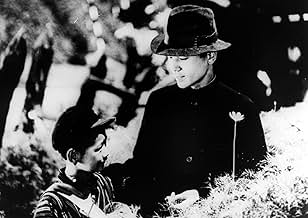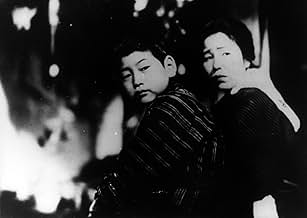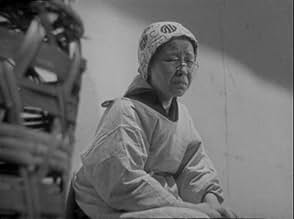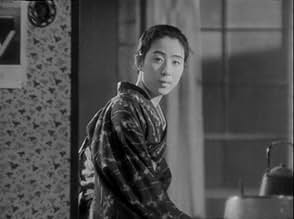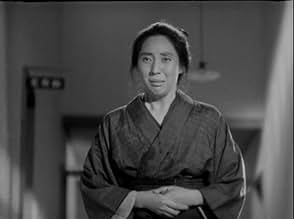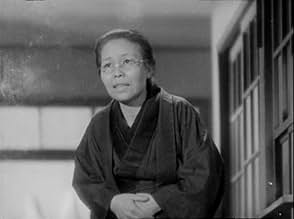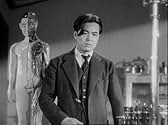ÉVALUATION IMDb
7,7/10
4,3 k
MA NOTE
Ajouter une intrigue dans votre langueA widow sends her only son away to receive a better education. Years later, she visits him, finding him a poor school teacher with a wife and son.A widow sends her only son away to receive a better education. Years later, she visits him, finding him a poor school teacher with a wife and son.A widow sends her only son away to receive a better education. Years later, she visits him, finding him a poor school teacher with a wife and son.
- Director
- Writers
- Stars
Jun Yokoyama
- Okubo's son
- (as Bakudan Kozô)
Tomio Aoki
- Tomibo
- (as Tokkan Kozô)
Seiichi Katô
- Kinjo no ko
- (as Seiichi Kato)
Avis en vedette
10soren19b
It is a shame that this film is not available for wider viewing. I had the opportunity of seeing it at an Ozu retrospective in Cleveland. This film measures up to the other great classic Ozu films. The impact of Ozu's films works in much the same way as Japanese painting. There is great power in its open spaces and silences. They lend greater power to the words and emotions that are expressed. The dignity of the characters as they struggle with life is moving. Ozu is a master
of world cinema because he deals with themes of universal import and he does so with impeccable style. Especially noteworthy in this film is his effective use of music and sound. All in all, a very worthwhile experience
of world cinema because he deals with themes of universal import and he does so with impeccable style. Especially noteworthy in this film is his effective use of music and sound. All in all, a very worthwhile experience
While having the privileged importance of being great director Yasujiro Ozu's first sound film, The Only Son also remains important for its emergence as the first truly "Ozu" work, in the sense that the very particular cinematic and thematic elements which make up what he is best known for coalesce together in a thoroughly emotional experience.
The story is simple enough, as Ozu usually tells. A widow attempts to save enough money for her son to go to college in Tokyo. She visits him years later, only to discover that he is not living the kind of sophisticated, well-off life she believed he would lead as a result of a college degree. What Ozu does with these characters is astonishing; he shows them in the most serene and simple of situations and settings yet uses his unique directing style to elicit subtle feelings and thoughts simmering just below the surface.
What this seems to suggest is Ozu's feelings regarding Japan in the 1930s, a tumultuous period in which the age of modernization seemed to be waning and Japanese society continued to be pressured into a militaristic hegemony. Clearly, Ozu resisted these transitions and his best offense was the films he made. The result is a quiet, gentle yet intense story about simple people wishing their lives, or the lives of their children, were better than they are. Through this, Ozu seems to reflect on the failure of Japanese innovation up to that point and the uncertainty of what the future might bring. Fortunately for the viewer, his specific style and insight remain as coherent and profound as ever.
The story is simple enough, as Ozu usually tells. A widow attempts to save enough money for her son to go to college in Tokyo. She visits him years later, only to discover that he is not living the kind of sophisticated, well-off life she believed he would lead as a result of a college degree. What Ozu does with these characters is astonishing; he shows them in the most serene and simple of situations and settings yet uses his unique directing style to elicit subtle feelings and thoughts simmering just below the surface.
What this seems to suggest is Ozu's feelings regarding Japan in the 1930s, a tumultuous period in which the age of modernization seemed to be waning and Japanese society continued to be pressured into a militaristic hegemony. Clearly, Ozu resisted these transitions and his best offense was the films he made. The result is a quiet, gentle yet intense story about simple people wishing their lives, or the lives of their children, were better than they are. Through this, Ozu seems to reflect on the failure of Japanese innovation up to that point and the uncertainty of what the future might bring. Fortunately for the viewer, his specific style and insight remain as coherent and profound as ever.
This is a nice piece of work from early Japanese cinema that's worth checking out for all fans of this period's films.
The plot is simple, nothing really special if you ask me, but Ozu sure knew how to handle this kind of simple stories he portrayed in all his films. It's a slow-paced film, which adds a more natural feeling to it in my opinion, full of powerful and emotional images supported by a really splendid and natural acting (as usual in Ozu's films).
Ozu really stands out from many other directors, he had the ability to portray life on screen and here you can definitely see it.
At first this kind of filmmaking didn't do much for me, but it has really grown on me with time. It surely is not for everyone; Ozu is just different cinema.
My score: 8.5/10
The plot is simple, nothing really special if you ask me, but Ozu sure knew how to handle this kind of simple stories he portrayed in all his films. It's a slow-paced film, which adds a more natural feeling to it in my opinion, full of powerful and emotional images supported by a really splendid and natural acting (as usual in Ozu's films).
Ozu really stands out from many other directors, he had the ability to portray life on screen and here you can definitely see it.
At first this kind of filmmaking didn't do much for me, but it has really grown on me with time. It surely is not for everyone; Ozu is just different cinema.
My score: 8.5/10
"The Only Son" is Ozu's first "talkie" - and utilizes sounds in an efficient, restrained manner to help tell the story with calm grace. The beautiful simplicity that pervades the piece is classical Ozu, and amplifies the poignant tale of a mother coming back to visit her son, after sacrificing her livelihood to ensure he achieves higher education. When she realizes that he is unsatisfied with his life as a night-school teacher, a general melancholic tone begins to unfold through the progression of the narrative. The ending is nicely done, and overall, the film is crafted in that spare, simple perfection that is the stylistic hallmark of Ozu's cinema.
"The Only Son" is Ozu's first "talkie" - and utilizes sounds/dialogue in a stylistic manner to tell a simple story. The beautiful simplicity that pervades the piece is classical Ozu, and amplifies the poignant tale of a mother coming back to visit her son, after sacrificing her livelihood to ensure he achieves higher education. When she realizes that he is unsatisfied with his life as a night-school teacher, a general melancholic tone begins to unfold through the progression of the narrative.
There are some fine indoor shots of the house where the son lives, and also, some greatly composed scenes of the run-down industrial neighborhood where the son goes out to buy "noodles" from a nearby stand. What's also memorable about the film is its excellent rendition of outdoor nature shots, one scene stands out in my mind where the son is having a discussion with his mother. There is also a great shot of the night-school teacher looking out dismal and lonely from the school-building to a city sign, which is juxtaposed against a dark, night sky.
The ending is nicely done, and overall, the film is crafted in that spare, simple perfection that is the stylistic hallmark of Ozu's cinema.
There are some fine indoor shots of the house where the son lives, and also, some greatly composed scenes of the run-down industrial neighborhood where the son goes out to buy "noodles" from a nearby stand. What's also memorable about the film is its excellent rendition of outdoor nature shots, one scene stands out in my mind where the son is having a discussion with his mother. There is also a great shot of the night-school teacher looking out dismal and lonely from the school-building to a city sign, which is juxtaposed against a dark, night sky.
The ending is nicely done, and overall, the film is crafted in that spare, simple perfection that is the stylistic hallmark of Ozu's cinema.
Le saviez-vous
- AnecdotesThis was Yasujirô Ozu's first feature film with all-synchronous dialogue.
- ConnexionsFeatured in A Train Arrives at the Station (2016)
- Bandes originalesOld Black Joe
Written by Stephen Foster
Meilleurs choix
Connectez-vous pour évaluer et surveiller les recommandations personnalisées
- How long is The Only Son?Propulsé par Alexa
Détails
- Durée1 heure 22 minutes
- Couleur
- Mixage
- Rapport de forme
- 1.37 : 1
Contribuer à cette page
Suggérer une modification ou ajouter du contenu manquant

Lacune principale
By what name was Le fils unique (1936) officially released in India in English?
Répondre
